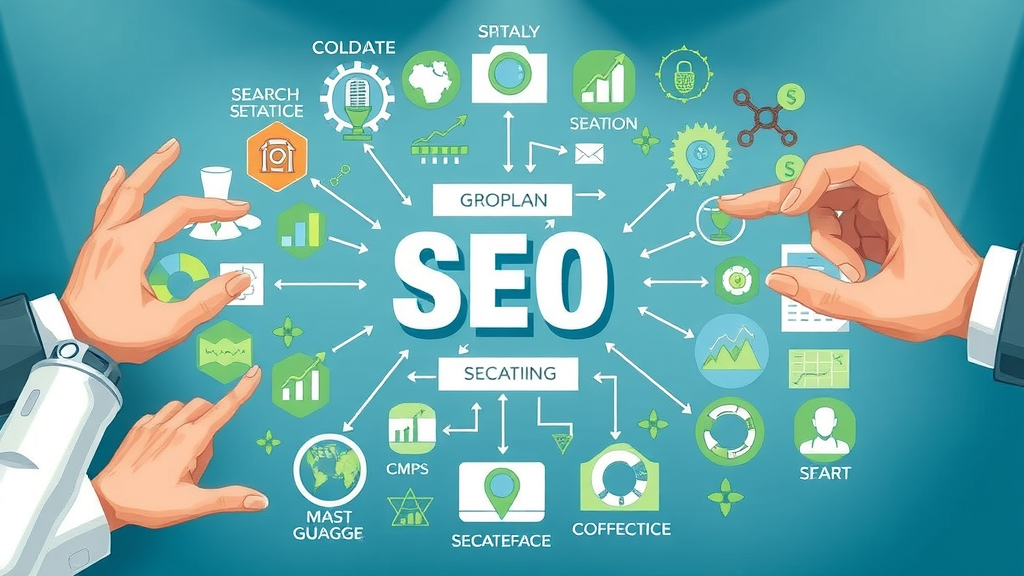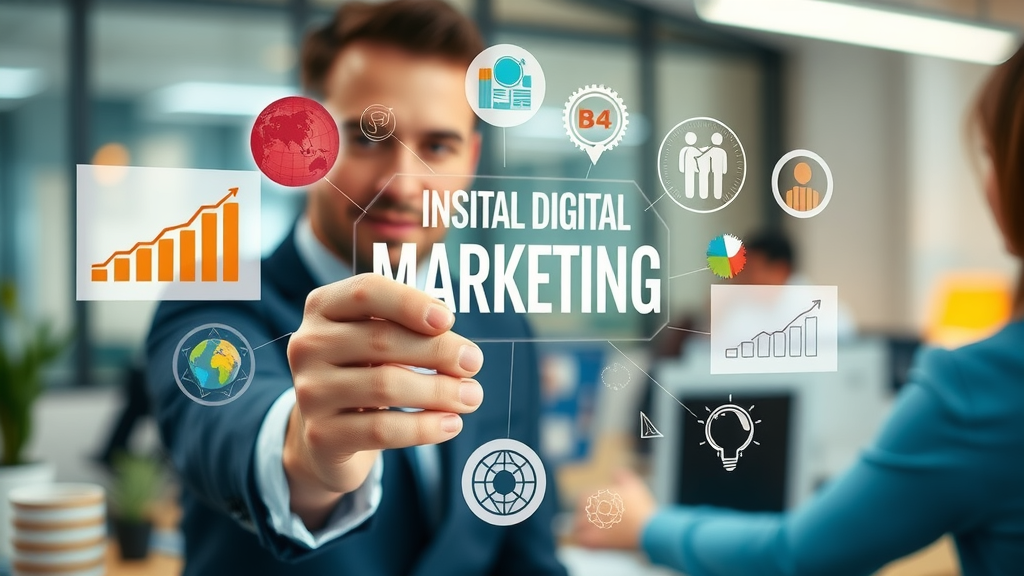An Introduction to Digital Marketing Channels
Did you know? The global digital marketing industry was valued at over $322 billion in 2020 and is expected to reach over $640 billion by 2027. This statistic underscores the immense growth and impact of digital marketing channels in today's business landscape. But what are digital marketing channels, and how can they propel your business forward?
Digital marketing channels are platforms that businesses leverage to promote their products or services and connect with potential customers online. These channels are the digital equivalent of traditional marketing avenues but offer a more diverse and globally reaching approach through online means.

The Core Components of Digital Marketing
Understanding Digital Marketing Channels
Delving into the concept of digital marketing channels reveals that these are structured pathways that enable the dissemination of marketing messages to a vast audience. Each channel serves a specific purpose, influenced by the nature of the message, the target audience, and the desired outcome of the campaign. Businesses use digital marketing to create awareness, drive engagement, and ultimately convert prospects into loyal customers.
Exploring Various Marketing Channels
Marketing channels in the digital realm abound, each offering distinct advantages and specific applications based on business goals. From social media platforms to email marketing, each channel caters differently, allowing businesses to tailor their messaging effectively. For instance, while social media is fantastic for building brand communities, email marketing excels at nurturing leads through personalized communication.

Key Types of Digital Marketing Channels
Content Marketing: The Power of Storytelling
Content marketing involves creating and distributing relevant and valuable content to attract and engage a clearly defined audience. This marketing strategy is all about telling a story that resonates with potential customers, fostering trust and authority, and ultimately driving profitable customer action. Think of blogs, ebooks, podcasts, and webinars as vehicles for delivering this content.
Search Engine Optimization: Enhancing Discoverability
Search Engine Optimization (SEO) is critical in digital marketing, enabling websites to be more visible in search engine results pages (SERPs). By optimizing content with relevant keywords and improving site metadata, businesses can significantly increase their online visibility and attract more organic traffic. SEO is an ongoing process that helps businesses maintain their web presence and reach a wider audience.

Social Media Platforms: Broadening Reach
Social media marketing utilizes platforms like Facebook, Instagram, Twitter, and LinkedIn to reach and engage a broad audience, creating a two-way dialogue with customers. These platforms allow businesses to share content, advertise services, and build a strong brand identity. Social media marketing is effective for increasing brand visibility and fostering community relationships.
Email Marketing: Direct and Personal
Email marketing remains a potent tool for businesses to connect directly with their audience. By tailoring messages to specific segments of an email list, businesses can nurture leads, drive conversions, and retain existing customers. This channel is cost-efficient and allows for measurable outcomes, making it invaluable in any digital marketing strategy.
Paid Advertising: Targeted Visibility
Paid advertising, including digital ads through platforms like Google Ads, provides targeted visibility and immediate reach to a specified audience. It allows for precise targeting based on demographics, interests, and behaviors, ensuring message deliverance to those most likely to engage and convert. This method is highly trackable, offering insights into campaign performance and return on investment.

Affiliate Marketing: Collaborative Growth
Affiliate marketing is a collaborative approach where businesses partner with affiliates who promote their products or services in exchange for a commission on resulting sales or conversions. This marketing channel is performance-based, reducing financial risk and expanding reach through affiliates' audiences.
What are the 7 Types of Digital Marketing?
Answer the Question: What are the 7 types of digital marketing?
The seven primary types of digital marketing include Search Engine Optimization (SEO), Content Marketing, Social Media Marketing, Pay-Per-Click (PPC) Advertising, Affiliate Marketing, Email Marketing, and Mobile Marketing. Each type serves distinct purposes and can be integrated for enhanced marketing success.

What are the 5 Marketing Channels?
Answer the Question: What are the 5 marketing channels?
The five major marketing channels include direct mail, catalogs, telemarketing, internet marketing, and mobile marketing. Each channel provides unique opportunities to engage with potential customers based on preferences and lifestyle.
What are the Four Types of Digital Marketing?
Answer the Question: What are the four types of digital marketing?
Four crucial types of digital marketing include Content Marketing, Search Engine Marketing (SEM), Social Media Marketing, and Email Marketing. These types encompass the core strategies businesses utilize to reach and influence a wide array of digital audiences.
Is Amazon a Digital Marketing Channel?
Answer the Question: Is Amazon a digital marketing channel?
Yes, Amazon functions as a digital marketing channel. It provides businesses with a platform to reach millions of consumers worldwide. Through Amazon Marketplace, sellers can take advantage of Amazon's global reach and offer their products directly to targeted customers, often employing the company's advertising services for enhanced visibility.

Utilizing Search Engines in Marketing
The Role of Search Engine Optimization in Digital Marketing
SEO is integral to digital marketing, allowing businesses to optimize their websites and content for better placement on search engines, and driving organic traffic. Effective SEO strategies increase visibility, enhance credibility, and provide a significant return on investment.
Best Practices for Using Digital Marketing Channels

How to Choose the Right Digital Marketing Channel for Your Business
Selecting the right channel depends on your business goals, target audience, budget, and resources. Considerations include audience preferences, the type of engagement desired, and long-term strategic goals. Integration and consistency across chosen channels ensure a cohesive marketing strategy.
Measuring Success: Key Performance Indicators (KPIs)
Effective digital marketing requires clear KPIs to measure success, such as website traffic, conversion rates, email open rates, and ROI. Regular analysis helps optimize strategies for better performance, ensuring resources are effectively utilized.
Building Brand Awareness through Media Marketing
Media platforms facilitate brand awareness by enabling businesses to reach broader audiences. Consistent messaging, engaging content, and interactive engagement foster increased recognition and brand loyalty.
Quotes from Industry Experts
"Digital marketing is not an art of selling a product. It's an art of making people buy the product that you sell." — Expert Marketer
"The best marketing doesn't feel like marketing." — Tom Fishburne

FAQs
What You'll Learn from Digital Marketing Channels
By exploring various digital marketing channels, you'll acquire insights into enhancing online presence, optimizing content for search visibility, and engaging effectively with target audiences. You'll learn strategies to leverage each channel for maximizing ROI and achieving business growth.
Conclusion
Summarize the importance of understanding and leveraging digital marketing channels for business growth.
Grasping the complexities and leveraging the potential of digital marketing channels is crucial for achieving business objectives and sustained growth in a competitive digital landscape.
Tables
| Digital Marketing Channel | Advantages | Disadvantages |
|---|---|---|
| SEO | Increases visibility, cost-effective, long-term impact | Requires time and expertise to implement effectively |
| Social Media | Wide reach, builds community, real-time engagement | Can be time-consuming, requires consistent content |
| Email Marketing | Personalized communication, cost-efficient, measurable | Potential spam issues, requires quality email lists |
Lists
- Understand your target audience to choose suitable channels.
- Consistently evaluate the effectiveness of your digital marketing strategy.
- Create compelling content that resonates with the audience.
- Invest in data analytics to drive informed marketing decisions.
- Adapt and evolve your approach to keep up with digital trends.
 Add Row
Add Row  Add
Add 




Write A Comment